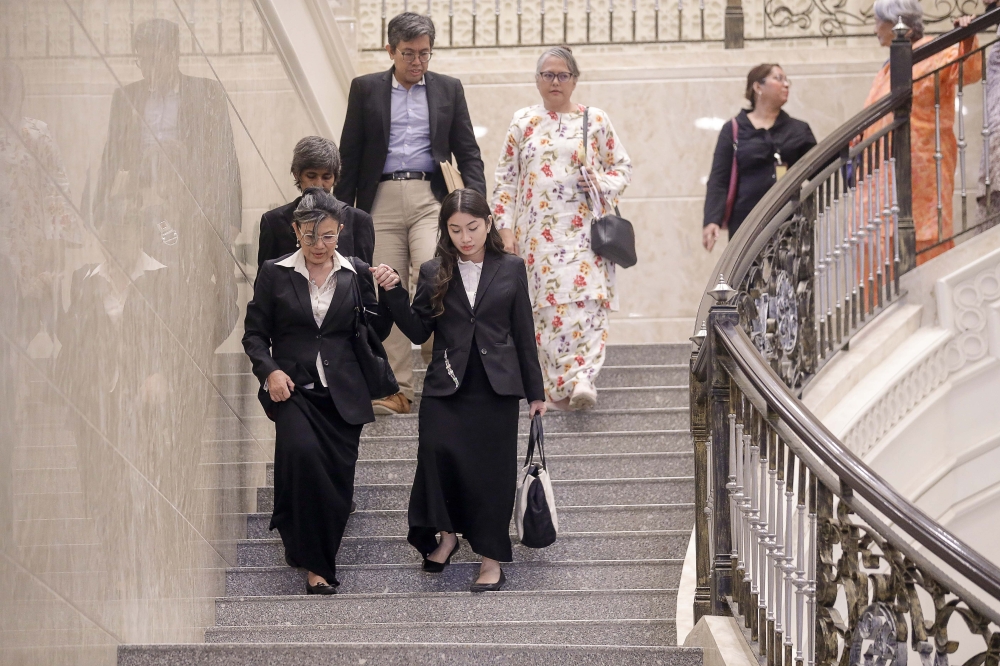KUALA LUMPUR, Feb 10 — Former religious affairs minister Datuk Seri Mujahid Yusof Rawa today advised PAS to not mislead its followers and the Muslim community on the recent Federal Court’s decision to strike down 16 out of 18 provisions under the Kelantan Shariah criminal enactment as unconstitutional.
The senator urged the Islamist party to instead, rightfully explain the judgment and “to be honest” rather than using the verdict as political fodder that undermines the harmony of the nation’s laws.
“PAS should acknowledge that the decision to annul 16 provisions in the Kelantan Shariah Criminal Enactment (EJSK) reflects the weakness of the Kelantan State Legislative Body or State Legislative Assembly (DUN) which, without careful consideration, passed several provisions in the EJSK that exceeds its legislative jurisdiction as noted in the judgment of the chief justice.
“Many among PAS Members of Parliament and State Assembly members should take on the role of explaining how the legislative process works and what powers are allocated by the Federal Constitution, to which all Members of Parliament and ADUNs take an oath of allegiance to defend,” he said.
Mujahid said that PAS should embrace the spirit of the decision by improving the process of crafting Shariah criminal laws more meticulously and should accept advice concerning the powers vested in the DUN, which every state assemblyman swore to protect and uphold when they were elected by the people.
Instead, he lamented that the party had misled its followers and some Muslims, by falsely claiming that the Shariah courts are now under threat and being challenged.
“Some have even claimed that Allah’s laws are being repealed at the behest of liberal groups. This is a lie that can breed hostility and hatred, undermining the harmony of the country and directly disrespecting the Federal Constitution,” he said, adding that the reality is that the EJSK provisions fall under the category of Takzir and not Hudud or Qisas.
“Shariah criminal laws are similar to civil criminal laws at the federal level, in that they are considered Takzir, which are deemed suitable by the country, to maintain the welfare and security of the people and the state. The difference lies in the authority of Shariah criminal laws (except for the Federal Territories) being enacted and passed by the respective State Legislative Assemblies,” Mujahid explained.
Echoing the Federal Court’s verdict, Mujahid added that the Takzir laws enacted by the Kelantan State Legislative Assembly were annulled because they exceeded the jurisdiction limits set by the Federal Constitution by enacting laws that contradict the available provisions at the federal level.
“This means that criminal offences committed are still subject to punishment under Federal Laws as Takzir. So how can it be claimed that this (Federal Court) decision is to abolish Islamic laws? Takzir can be annulled if the same law already exists at the federal level, to prevent two punishments for the same crime from being imposed on the offender, with respect to the principle of justice.
“The annulment of 16 provisions in the EJSK is a failure of PAS state assemblymen in Kelantan to examine all 18 provisions being questioned,” he added.
Mujahid also called on the people of Kelantan to question which of their state assemblymen approved the EJSK and who was the Speaker of the Kelantan State Legislative Assembly who chaired the session at that time, as well as the legal adviser who was consulted during the said period.
“Morally and legally, the annulment of 16 provisions in the EJSK by the Federal Court, is a failure of the functions of the state assemblymen and the Speaker, tarnishing the image of the State Legislative Assembly, in that it did not respect the powers allocated to it by the Federal Constitution.
“The decision of the Federal Court on February 9, is a severe blow to the Kelantan state government and shows how weak it is in drafting Shariah criminal laws. Other states should also learn from this decision to avoid future violations of jurisdiction,” he added.
Chief Justice Tun Tengku Maimun Tuan Mat, who led a nine-member panel of judges on Friday, delivered the majority verdict of 8-1 in the constitutional challenge filed by lawyer Nik Elin Zurina Nik Abdul Rashid and her daughter, Tengku Yasmin Nastasha Abdul Rahman.
Nik Elin, a native of Kelantan, along with her daughter, filed a petition directly with the Federal Court under Article 4(4) of the Federal Constitution, naming the Kelantan government as the sole respondent in this case.
The duo had challenged the constitutionality and validity of 18 provisions under the Kelantan Shariah Criminal Code (left) Enactment 2019, claiming that the Kelantan State Legislature does not have the power to enact laws on these offences because there are federal laws covering the same.
Through the court challenge, the two women sought the Federal Court to declare that 18 provisions of Kelantan’s Shariah Criminal Code (I) Enactment 2019 are invalid, arguing that the Kelantan state legislative assembly had overstepped its powers or had no powers to make such laws.
Under the Federal Constitution’s Ninth Schedule, there are two different lists that say what the federal government — via Parliament — has powers to make laws on, and what the state governments — via their state legislative assemblies — have powers to make laws on.
List I is the Federal List which states what Parliament can make laws on, while List II or the State List provides a separate and shorter list of what state governments can make laws on.
In yesterday’s ruling, Chief Judge of Sabah and Sarawak Tan Sri Abdul Rahman Sebli was the only judge who dissented or disagreed with the majority.
Other judges on the nine-member panel are President of the Court of Appeal Tan Sri Amar Abang Iskandar Abang Hashim, Chief Judge of Malaya Tan Sri Mohamad Zabidin Mohd Diah; Federal Court judges Tan Sri Nallini Pathmanathan, Datuk Mary Lim Thiam Suan, Datuk Harmindar Singh Dhaliwal, Datuk Nordin Hassan and Datuk Abu Bakar Jais.






















